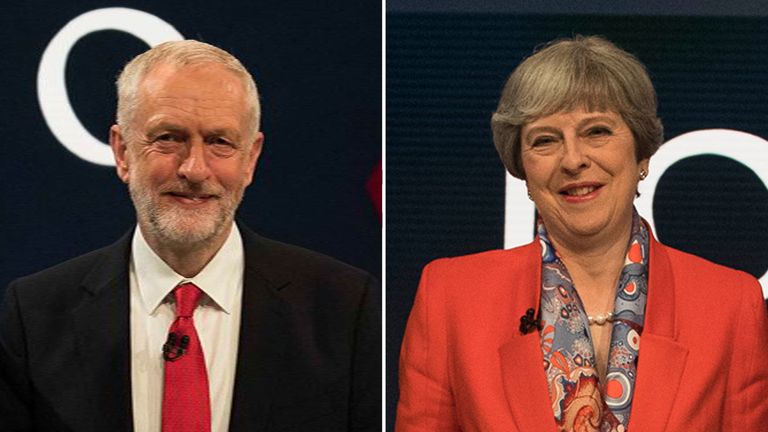Two-horse election race with flawed leaders nears its end
Voters in the middle face a stark choice between nationalism and nationalisation, Sky's Faisal Islam writes.
Wednesday 7 June 2017 18:12, UK
A day is left in what must be the strangest election campaign in British history.
I have spent the last 48 hours with Jeremy Corbyn in the North East and Theresa May in Wales and the West of England.
Shares in Theresa May have fallen, but it is difficult to discern by exactly how much. To have an election campaign built on soaring approval ratings, only to see them turn negative in the week before the General Election is nothing short of extraordinary.
Mr Corbyn has turned around very negative perceptions by talking directly to voters, and now scores net approval ratings in the same zone as Mrs May.
There is also a spot of old British support for the underdog. He has consolidated the left progressive vote, the bulk of Remainers and young people, and motivated a section of voters who would not normally vote. It is impossible to tell just how many, and whether they are in the right constituencies.
::
The Conservative campaign was built on the notion that Mr Corbyn was not even eligible to think about being the inhabitant of Number 10. would amount to a disqualifying red line for the Labour leader, it calculated.
It was a campaign designed to take advantage of a moment, the triggering of Article 50, and Mr Corbyn's unpopularity, to deliver a massive majority. It relied on painting the Labour leader as abnormal and dangerous.
It therefore failed to take him on toe-to-toe on some economically controversial policies, and on basic competence, until the last few days.
Big business leaders were eschewed and demotivated by Mrs May's approach to Brexit. In this last 24 hours, some Conservatives might reflect that the last two attempts to pull off a campaign such as this, in the EU referendum and in the London Mayoral campaign, did not work.
All of this was rolled in to a type of Brexit nationalism. Brexit will make everything better was the appeal, but only if the PM's hand is strengthened with the votes of most of the nation.
But there has been no further detail on any aspect of her approach to this subject and in particular what it would actually mean to people's lives and livelihoods if Britain left the European Union with no negotiated deal in March 2019. , it did return to the issue of Brexit, however.
That said, the Labour leader has also pursued an intriguing style of campaign, turning up at the ultra-safe Labour seats of his close allies for well attended tub-thumping rallies, and missing out on many of the marginals he needs to win.
His team say it is because they get the TV pictures that look good in the regions that they need. There is an important question mark about whether he has changed opinion where it matters.
From the Labour conference time, Mr Corbyn's team have been toying with the deployment of . They have learnt the lessons of the Vote Leave campaign and are applying them ruthlessly against the many Vote Leavers who now work for Mrs May.
The ideas are popular with a large section of the electorate, it transpires, but they are radical too. The size of the state and public spending happens to be bigger in some other G7 nations. None have had the significant shift in their economic model implied by Mr Corbyn's manifesto in one election. And yet both this and No Deal Brexit have barely been debated.
::
Of course that is partly down to the horrors of Manchester and London Bridge. But even accounting for them, it is clear that the Conservatives have failed to set the agenda for most of the past three weeks.
It must also be remembered that Mr Cameron oversaw only the second post-war austerity Government to be re-elected. And he got a bigger majority. That was unprecedented.
But cuts to public services were always going to catch up with his party eventually. The public was going to start to notice at some point. The audiences in TV debates and head-to-heads suggest that it has come, and at a bad time for the PM.
Ironies abound. The Conservative manifesto contained the seed of an attempt to challenge many decades of gerontocratic drift in our political system. It contained the smallest suggestion that spending on the costs of an ageing society should be at least be owned by that generation, rather than taxing a younger generation.
And yet Labour have amassed the youth vote against it. Spending on an ageing population is inevitably going up. Where now, in any party, is the opportunity to seek the funding for that from the wealthy in the same generation?
It has become a two horse race, but a steeplechase with an injured front runner being pursued by a long shot who started far behind.
So we are left with a choice for many people in the middle between two flawed candidates. How much do people who voted Leave define themselves by that issue?
Most Leavers are not Brexiteers, but do older ones prefer their winter fuel allowance of £300 in December? And how much do people value a conventional approach to defence and security, versus their concern over seven years of cuts to public services and pay freezes for civil servants?
Not long to find out now.
The public may yet discover a way to make them both lose.






